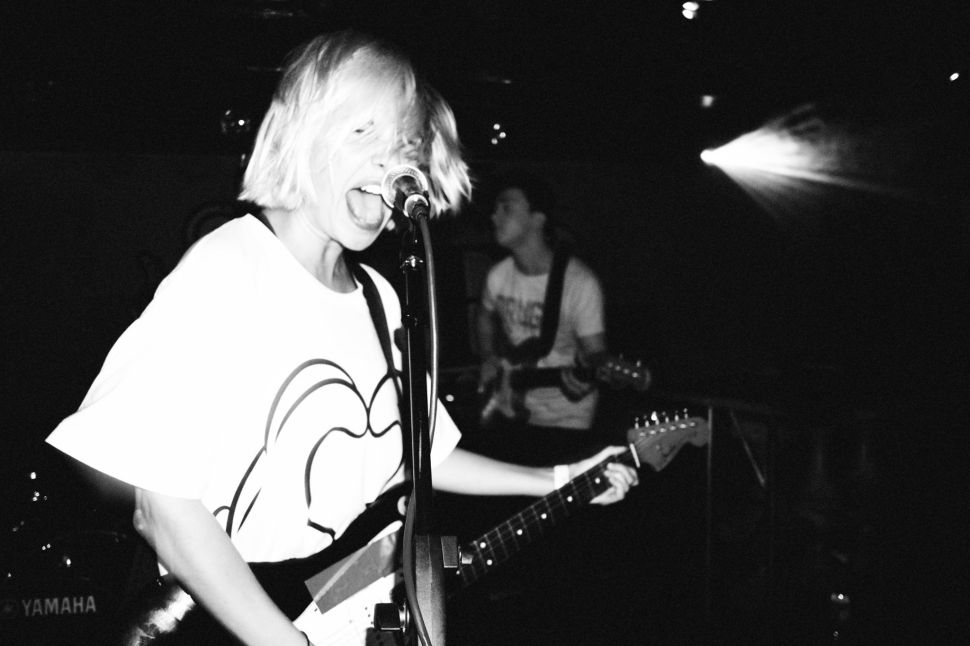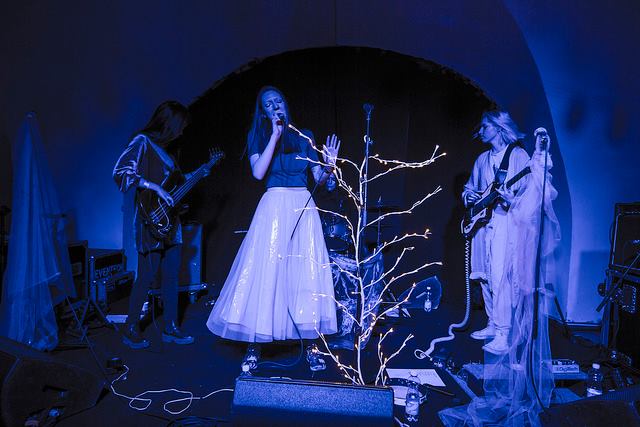
There are some of us who believe that the jittery, simple, electric shudder and shuffle and spit and lick and buzz and chime and hiccup and hoi-hoi of early Post-Punk is the ideal music for low-ceilinged, shadowy saloon clubs in the mean part of the city.
Remember those deep blue rooms where we spun darkly in the best of our youth, and formed enormous crushes on women wearing over-large men’s shirts over tights? We left part of our hearts in such places, where, in our mind’s eye, a sullen, vaguely rockabilly-looking DJ is always playing New Order’s “Ceremony,” “A Forest” by the Cure, and Pylon’s “Cool.”
The first dark and beautiful, loud and slanted, opaque yet naked flowering of Post-Punk (oh, 1979-1981) presented us with some of the greatest music of our time. What could be better than the reductionism and energy of punk mixed with an aspiration to Pink Floyd-ish ambience and Velvet/Eno (Velveteeno?) sculptural cruelty?
World peace, perhaps, but alas, this is not realistic.
However, a healthy dose of the shivering, stuttering Delta 5 or the sly, fidgety arpeggios of the Method Actors, ah, that is an achievable goal.
To me, the spirit of Post-Punk contains the essence of rock ’n’ roll: sexy, strange, primitive, creative, loud even when it isn’t, desperate even when it’s arrogant. Great Post-Punk makes you feel like you’re in love and peeing on an electric fence at the same time. At its best, Post-Punk is like Eddie Cochran and Mondrian having a party in Weimar Berlin.
Since its initial burst in the early-ish 1980s, Post-Punk has had occasional flare-ups. Half a decade or so ago in Williamsburg, it seemed every other band was trying to show off that they’d Spotify’d The Monochrome Set and Chairs Missing-era Wire; and of course, that whole shoegaze thing was very closely aligned to classic Post-Punk. But in general, I feel that spirit has ebbed as young American musicians flail about in some no man’s land of genre fishing, as they wonder if there’s any place for guitars in their future, much less hard-whacked skeletal aggro-art drums à la Hugo Burnham.
Ah, but the mousetrap snap and hissing snarl and cough-syrup grease fire of Post-Punk is freaking alive and very, very well.
In Russia, that is.
In Russia right now, a pile of bands is producing the most viscerally attractive, inventive, wiry, charged and ecstatic Post-Punk music anyone has made in a generation.

It’s a bit of a miracle to stumble across this new(ish) crop of Russian Post-Punk bands; it’s like finding a corner of the earth where it is always 1980, where Robert Smith still has short hair, and where you’re still combing McDougall Street record stores for anything that has a female bassist and comes out of Leeds.
Now, the paragraphs that follow are by no means any sort of organized rundown of the rather extraordinary renaissance of Post-Punk going down right now in Russia. Nor am I going to attempt to analyze the causes and conditions; I honestly have no idea why this is happening (perhaps Faith, Chairs Missing and a Lilliput 45 somehow became available in the former Soviet Union sometime in the late aughts, and the influence is now taking hold).[i]
But thanks to the advocacy of some friends who pay close attention to the patterns of alternative music throughout the world (I’ll acknowledge them at the end of this piece), I have become aware of some very, very interesting young bands working in Russia who are playing high-friction classic Post-Punk that is as good as any new guitar-based alternative music I’ve heard in ages.
Lucidvox is a remarkable band from Moscow. They’re a weird, hazy cross between the Raincoats and White Hills, and man, doesn’t that sound good?
[soundcloud url=”https://api.soundcloud.com/playlists/303578328″ params=”auto_play=false&hide_related=false&show_comments=true&show_user=true&show_reposts=false&visual=true” width=”100%” height=”450″ iframe=”true” /]
Lucidvox have got this billowing, gossamer, Plath-y kind of image going, and they match it with utterly unique and arresting music that is adventurous, even playful, but very damn adult.
Strange, staggering, dramatic, fuzzy, agitated, urgent, and semi-incoherent, the songs of Lucidvox often sound like one of those Black Flag guitar solo sections, if it had been a) recorded in a Russian Orthodox Church and b) was actually good (Greg Ginn’s guitar solos tend to sound like the musical equivalent of an 11th grader trying to draw imitations of M.C. Escher on the back of their notebook; but Lucidvox’s twisted, snaky, happy/sinister music sounds more like rope bridges over a gorge between art and heartbreak).
At the same time, Lucidvox have a curious and attractive overlay of Faith-era Cure, an influence more apparent on their earlier work (Lucidvox have two albums out; both are satisfying and fascinating, but the new one, thanks to the interpolation of a stoner/fuzz/krautrock element less apparent in their earlier work, is a little more immediate). Live video shows them earnestly plucking at strings and trading whomps of rhythm and noise, and is beautifully reminiscent of some of the joyfully brilliant arty noise bands that populated the fringes of the Lower East Side and Soho in the early 1980s
The fabulous Pinkshinyultrablast sound pretty much exactly how you’d think a band called Pinkshinyultrablast might sound.
[bandcamp width=100% height=120 album=3418785445 size=large bgcol=ffffff linkcol=0687f5 tracklist=false artwork=small]They play a mucho-reverb whirr of hi-energy shoegaze (imagine something between the Buzzcocks and Mew, with a little bit of Sigur Ros, Stereolab, and Slowdive in their, too), topped with wild, trippy and skipping ethereal melodies (as if the Cranberries and Elastica merged to make space bubblegum punk, or imagine the Sundays hijacking the Jesus and Mary Chain).
Pinkshinyultrablast are from St. Petersburg and take their name from a 2002 album by the band Astrobrite; indeed, they share some sonic qualities with Astrobtite’s slushy hailstorm of reverb, but Pinkshinyultrablast has a fierce, infectious melodic heart that Astrobrite largely lacks.
Both of the Pinkshinyultrablast albums are terribly interesting, though I prefer the first, Everything Else Matters (the second, Grandfeathered, has a very slight stoner metal that defuses the focus of this already hazy band; the first album is more “classic” Post-Pink, bringing to mind the Passions or a more punk rock Cocteau Twins).
If there was a band like this in the States, I’d basically write about them every week, because this kind of blurry, whirry, whiplash ultra-pop is like freaking crack.
[bandcamp width=100% height=120 album=2343919766 size=large bgcol=ffffff linkcol=0687f5 tracklist=false artwork=small]
There is something deeply exciting about Moscow’s Fanny Kaplan (a band, not a person), who play—or rather, yelp and whelp out—loping, edgy, ultra-minimalist tense blurts of text, melody, and noise that almost defies description. I freaking love it.
Fanny Kaplan seem somewhat rooted in good ol’ No Wave, though if I had to scratch out a more immediate comparison, I’d probably say they sound like ESG imitating Suicide and/or Suicide imitating ESG, which is to say they remind me a bit of a transitional if somewhat obscure New York City No Wave band called Y Pants, and the slightly less obscure and utterly brilliant UT. Likewise, Fanny Kaplan has a certain very real affinity with the bass-driven sketches of bands like Pylon and (early) Oh Ok.
Because I am a total sucker for women making crazily inventive minimal noise with seemingly little concern for traditional structure or melody, in some ways Fanny Kaplan is my favorite of these bands; but if you don’t dig the No Wave/performance art noise thing, you might not quite agree.
[soundcloud url=”https://api.soundcloud.com/playlists/258981224″ params=”auto_play=false&hide_related=false&show_comments=true&show_user=true&show_reposts=false&visual=true” width=”100%” height=”450″ iframe=”true” /]
Finally, there’s ГШ (formerly known as Glintshake) who may be the most “promising” of the whole lot, and are certainly the most immediate.[ii]
ГШ may be the band that would make the most “sense” to American ears tuned to a semi-slick, hiccuping, radio-friendly No Doubt via Lene Lovich via the Au Pairs Post-Punk/New Wave kind of sound. They have the quirkiness of the early Sugarcubes and are tighter than an angry/happy slinky.
They also are clearly super professional in terms of their performance and imaging (to cite No Doubt again, they remind me of what No Doubt might have sounded like if they had listened to DNA and Gang of Four instead of the Specials and the Selecter; take that as a starting point, O.K.?).
ГШ could become big in America, and it could happen fast, and some promoter or some band should get them over here. Heck, maybe they already have. What do I know? I spend most of my time reading about the Civil War and old-timey radio.
In a different time, I mean specifically the 1990s, ГШ would have been signed to a major label in a minute and would have had tastemakers like Bowie, Thurston, J.T. Leroy or whoever talking about them like they were god. In the modern world, however, I could still see ГШ inspiring the same kind of hysteria that Arcade Fire did when they first began to blow and stomp through the lower 48.
An excellent starting point with ГШ is the live video linked below; I’ve got to say, if this video was an album, it would be the album of the year, hands down.
[youtube https://www.youtube.com/watch?v=5dEyAzu3Nww&w=560&h=315]
So there’s that (and a lot more, too, that I am not addressing in this very brief overview). Which is all to say that if you think inventive, quirky, tense and deeply engaging guitar-based alternative music is a thing of the past, you are freaking wrong; you’ve just been looking on the wrong side of the former Iron Curtain. Smart-assed, art-assed, thrilling and frantic guitar rock is alive and fucking well, no matter what you’ve been told.
Finally, Let me thank two people who were indispensable in this voyage of discovery: Alex Maiolo was a first-hand witness to Tallinn Music Week, which was a great big coming out party for a lot of the state-of-the-art Cyrillic Post-Punk; he is also the Guitarist in Lacy Jags, a writer for Tape Op, Reverb.com, and Premier Guitar, and one of the anchors of the Raleigh/Durham/Chapel Hill/Carrboro music scene. He made it his mission to turn me on to Lucidvox, and the rest followed.
Secondly, but not secondly, John Robb, the leader of the legendary Membranes and the man behind the equally legendary Louder Than War webzine, was another indispensable source of information about this unexpected treasure of a scene.
[i] In the January 4, 2010 issue of The New Yorker, Rebecca Mead wrote (with great wit and articulation) that the use of the terms “aughts” to refer to the first decade of the 21st century is “rooted in a linguistic error,” despite the fact that “a grudging agreement has been reached on calling the decade” by this name. I note this for the sake of any budding and/or argumentative proofreaders out there. By the way, if you are a budding proofreader, may I suggest you contact The New York Times? Their once-esteemed newspaper and website appear to be proofed by undergraduate interns from SUNY Plattsburgh. Your average NY Times piece contains more mistakes than a sixth grade paper on the Monitor and the Merrimack. I also caught this giant typo in the NY Times the other day: They claimed that Pwr Bttm, a third-rate Ween who are smugger than Danny Elfman staring at a poster of Frank Zappa and who make They Might Be Giants seem visceral and sincere, are worth listening to just because they use gender-neutral pronouns and therefore you’re a bad person if you don’t like them. Now, that’s a typo.
[ii] ГШ and Glintshake are, essentially, the same band; but after a few years and a few albums as Glintshake, the group decided to abandon English lyrics, change their name to the Cyrillic version of ‘Glintshake,’ and to pursue a more satisfying, aggressive, artistic, and less compromising style influenced by Soviet constructivism and other more deliberately local influences.

